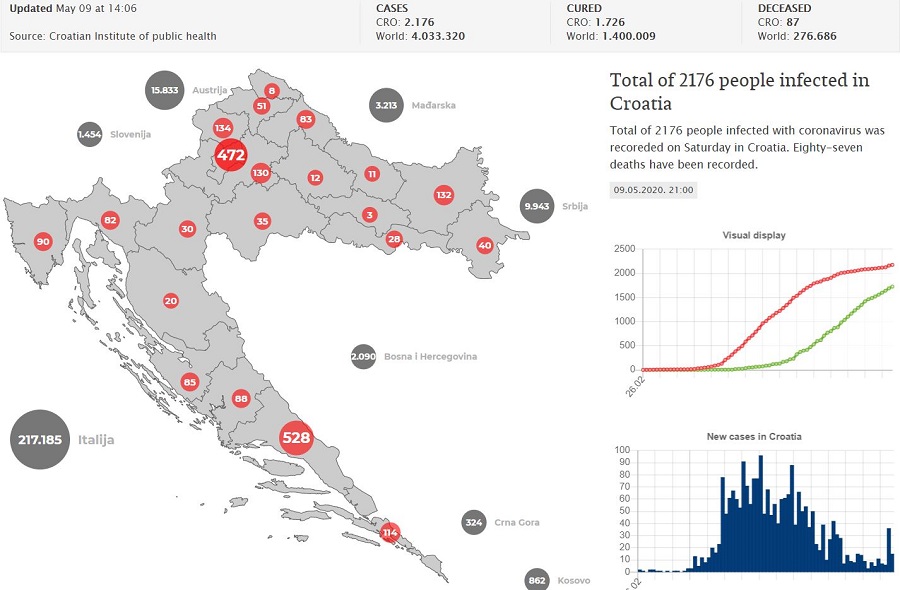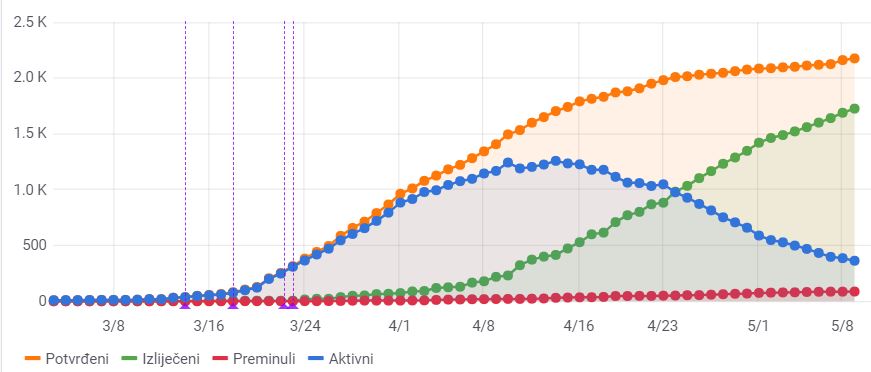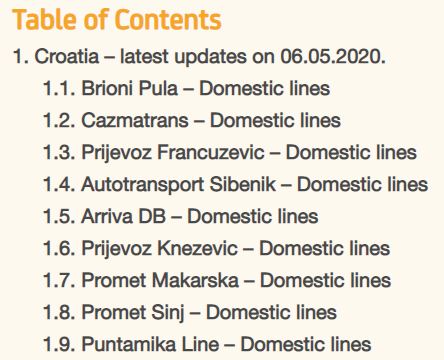Serbia and Bosnia Protest to Macedonia over Postage Stamp with WWII Croatia Map
ZAGREB, May 10, 2020 - Serbia and Bosnia and Herzegovina have protested to North Macedonia following the publication of a commemorative postage stamp showing a map of WWII Croatia which included parts of present-day Serbia and Bosnia and Herzegovina.
North Macedonia has issued commemorative postage stamps as part of the "North Macedonia in the EU" series ahead of Europe Day, including one dedicated to Croatia as the current president of the Council of the European Union. The stamp shows a map of the Independent State of Croatia (NDH), the Nazi puppet state that existed during the Second World War.
Serbia on Saturday presented a protest note with North Macedonia's charge d'affairs, saying that the stamp is "an attempt at historical revisionism" that undermines bilateral relations between Serbia and North Macedonia and cooperation and stability in the entire region.
The Serbian Ministry of Foreign Affairs demanded that the stamp be immediately withdrawn from circulation and that the government of North Macedonia condemn the move.
North Macedonia's postal service later expressed regret for displaying "a wrong map of Croatia and other countries in the region," adding that the entire circulation of 6,000 stamps was being withdrawn. The state-owned company said it was an unintentional mistake and that the stamp was meant to be a mark of gratitude to Croatia for supporting North Macedonia's EU integration bid.
Serbia said that it took the issue of such a stamp on Victory Day as an act of hostile provocation aimed against its territorial integrity and sovereignty and as an affront to the Serbian people who had been killed in their hundreds of thousands in NDH-run concentration camps.
Bosnia and Herzegovina's Ministry of Foreign Affairs expressed concern about the promotion of such a stamp, as well as hope that it was an unintentional omission and that it would be strongly condemned by the government of North Macedonia.
It acknowledged the apology offered by North Macedonia's postal service and expressed hope that this incident, which was seen as an attempt to rewrite historical facts, would not affect the otherwise good relations between the two countries.
More news about relations between Croatia and Macedonia can be found in the Politics section.
Croatian House Prices Expected to Stabilise, Sales to Decrease
ZAGREB, May 10, 2020 - The Croatian National Bank's (HNB) house price index showed a 9% increase in 2019 compared to 2018, the highest growth rate since 2007, but analysts expect a significant decrease in sales, and a stabilisation of prices.
Last year's 9% increase was fuelled by higher prices of new (+8.3%) and existing buildings (+9.1%).
Regionally, the most pronounced price increase was registered in the City of Zagreb (+13.2%), while lower growth rates were registered on the Adriatic coast (+6.9%) and elsewhere (+3.8%).
Despite the significant increase in house prices in 2019, on the national level they were still lower on average compared to 2008, down by 2.4%.
Analysts from Raiffeisen Bank (RBA) expect a stabilisation of house prices and a decrease in sales.
As they noted, the first three months of 2020 brought a further increase in prices, but due to an expected severe economic contraction and a consequent increase in unemployment, a further increase in prices and demand for residential properties will be stopped by the present uncertainty and risk aversion.
"We expect a significant decrease in sales on the house market during the second and third quarters, considering the fact that, apart from the decreased demand, a portion of market participants will defer the buying and selling of real estate at current prices," RBA said.
RBA also noted that, with the acceleration of the growth rates in 2019, house prices in Croatia were growing more than twice as fast as the EU average (4.2%) on an annual level.
As for countries in Croatia's immediate surroundings, only Italy registered a further decline of house prices for the third consecutive year (-0.1%), while other countries are still observing increases.
The Czech Republic registered an increase of 9.2%, Hungary of 14.8%, Slovenia of 6.9%, and Slovakia of 9.1%.
As for the final quarter of 2019, the house price index registered an increase of 2.9% compared to the third quarter of 2019, and a 10% increase compared to the last quarter of 2018.
The yearly price increase in the last quarter of 2019 was driven by higher prices of new and existing buildings throughout Croatia, and an acceleration of the annual growth rates was registered in all categories.
Year on year, the most significant price increase was registered in the City of Zagreb (14.7%), while the Adriatic coast (6%) and other parts of Croatia (7.5%) registered somewhat more modest growth rates, RBA said in its analysis of the HNB data.
More real estate news can be found in the Business section.
86 Tonnes of Medical Supplies Flown from China
ZAGREB, May 10, 2020 - About 86 tonnes of protective medical equipment intended for the Croatian healthcare system and other services fighting the coronavirus epidemic was flown to Zagreb from Shanghai, China, on Sunday morning, the government said.
It was the seventh, and for now last, shipment from China, delivered by an SF Airlines aircraft. Further supplies would be brought by land and sea.
The latest shipment included 80 tonnes of disinfectant and face masks which the Croatian government bought from the Sinopharm company, as well as six tonnes of donations, including ventilators, face masks and visors provided by the Alibaba Foundation and the Jack Ma Foundation.
The shipment also included a donation from the Meheco company to Zagreb's Hospital for Infectious Diseases, a donation from Zhejian Province to Istria County, and a donation to the Civil Protection Service from the CitizenGO initiative and Mr Cai Yu, a businessman who helped with the opening of the franchise of the Zagreb Museum of Illusion in Shanghai.
More news about relations between Croatia and China can be found in the Politics section.
Where Will Croats Go After the Measures are Eased?
May 10, 2020 - While we were patiently waiting for the measures to be eased, we asked Croats about their plans on the first day with a bit more freedom.
After almost two months of strict measures that limited our freedom of leaving our homes or the county, today there was a decision to eliminate e-passes, except for Brač, where, according to the decision, there is still ban on movement and gathering. Thus, on Brač, the measures from before April 27 are applied. Here is the link about the situation on Brač.
We asked Croats how they are planning to spend the very first day with new, eased measures and gathered 311 responses.
The first statement was, "I'll go to the cafe for coffee," and surprisingly, for a nation who loves enjoying the sun on the terrace while drinking coffee with friends, just 52,2% said yes.
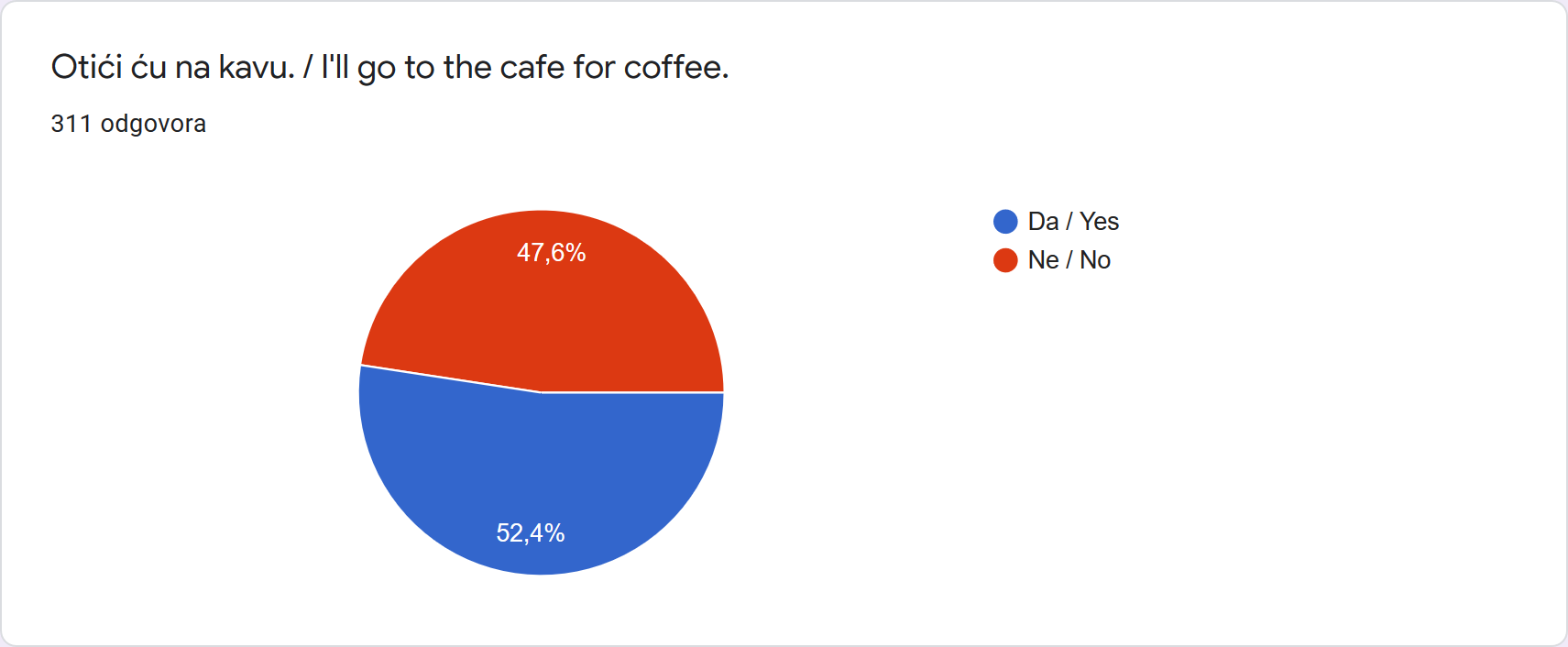
They are even less ready to leave their county, with a total of 55% negative answers.
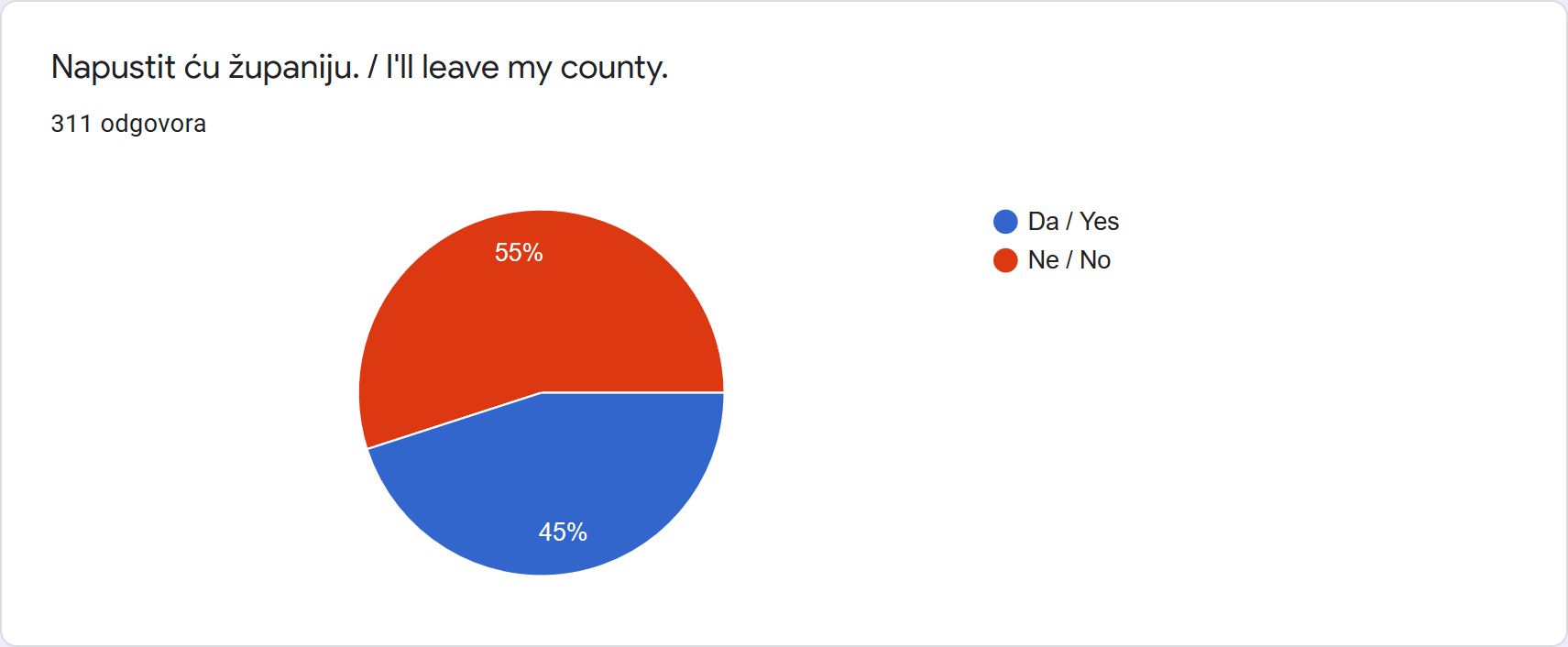
But, when it comes to visiting friends, here, the "yes" answer confidently wins with a total of 71,4%.
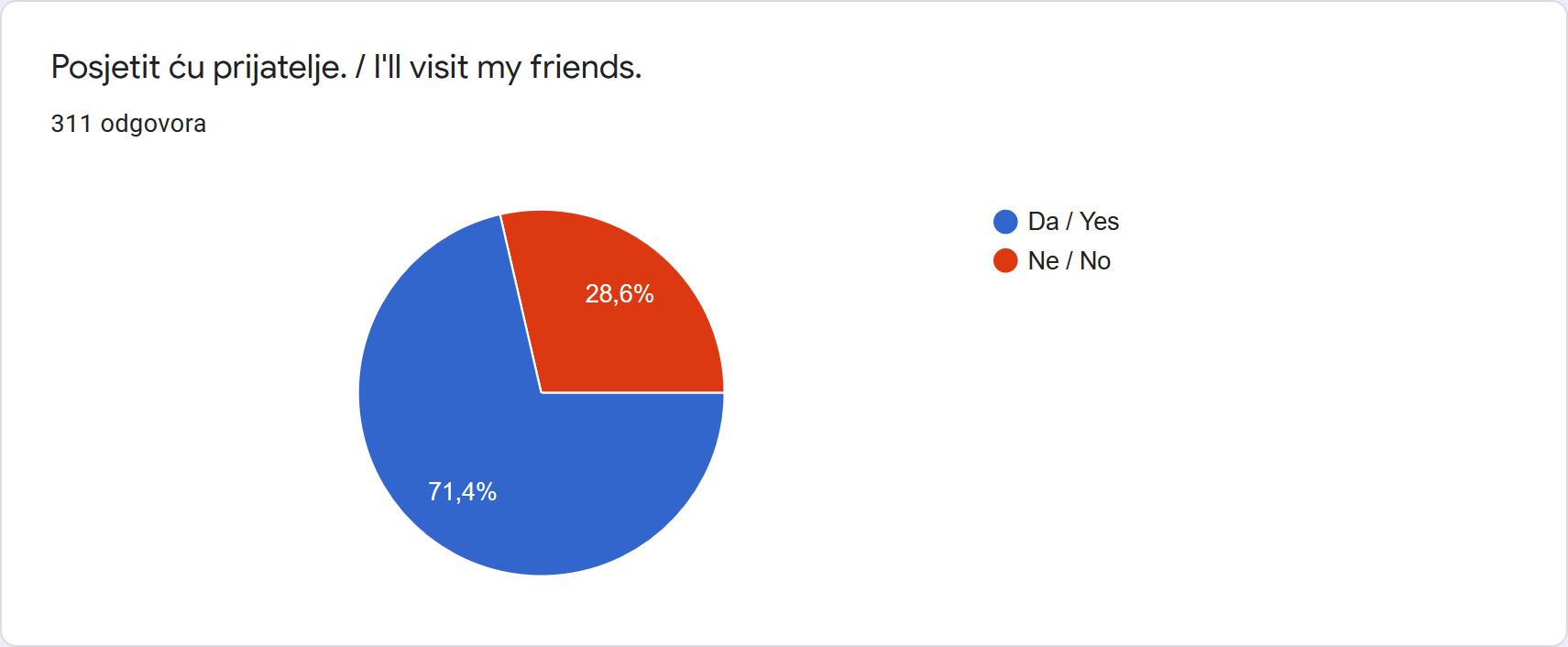
The caution when it comes to shopping is still here - 70,4% of people said they wouldn't go to shopping centers.
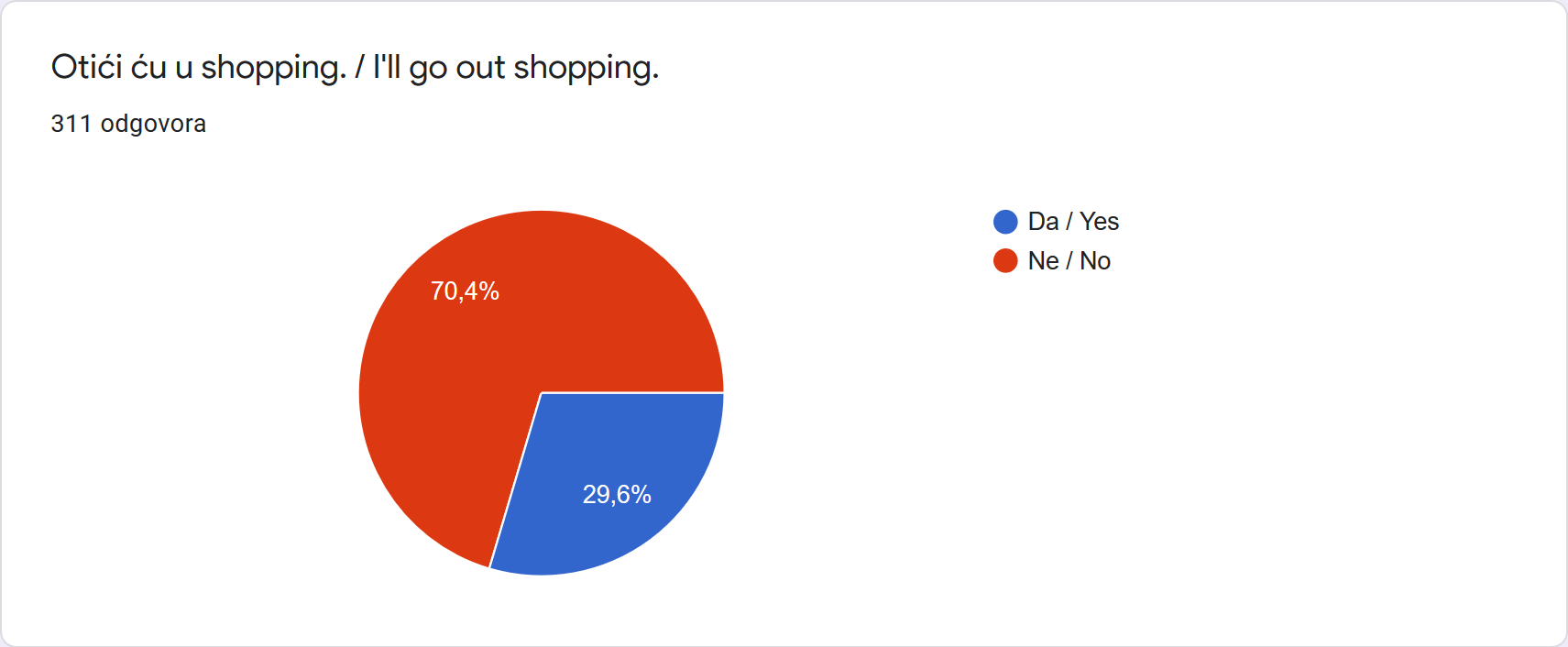
A little less than half of the people answered that they wouldn't stay home, which, after almost two months without that luxury, is understandable.
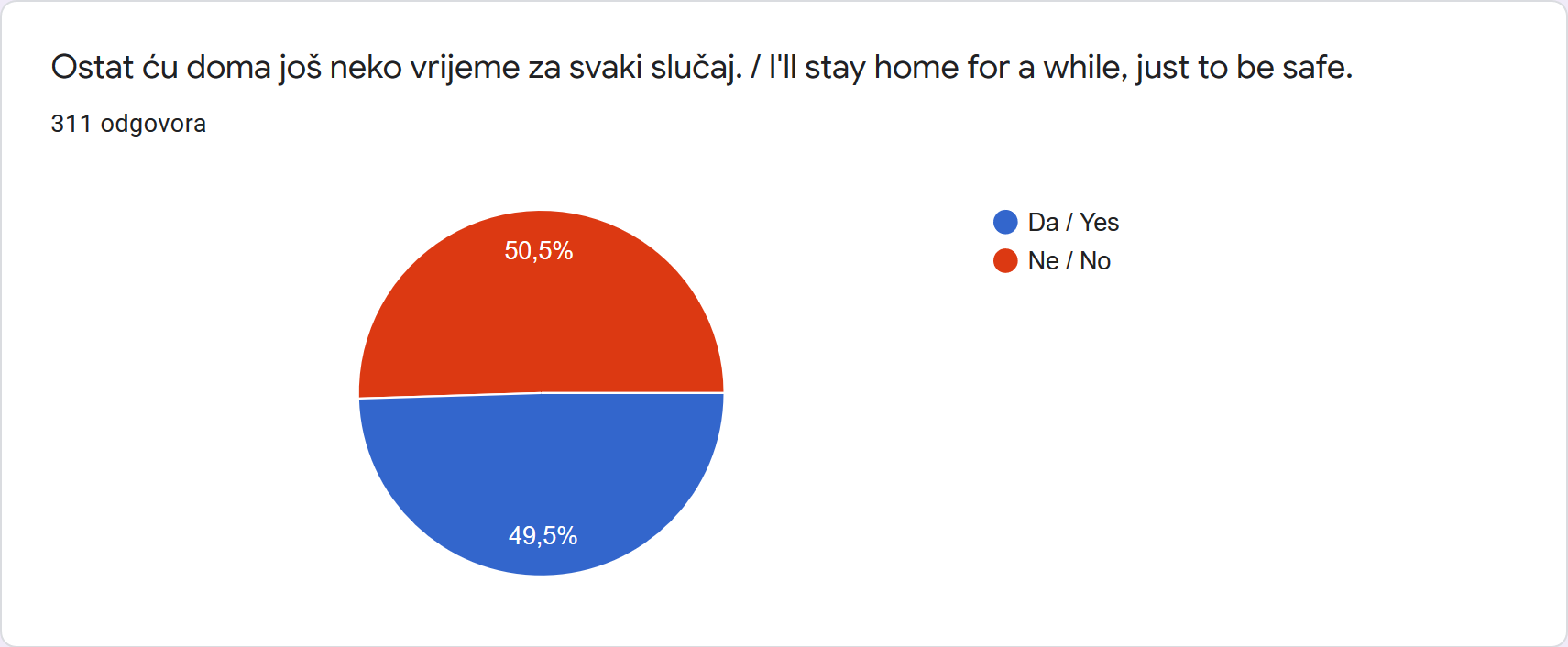
In the last statement, Croats showed responsibility once more - a total of 82,3% of people steal the show.
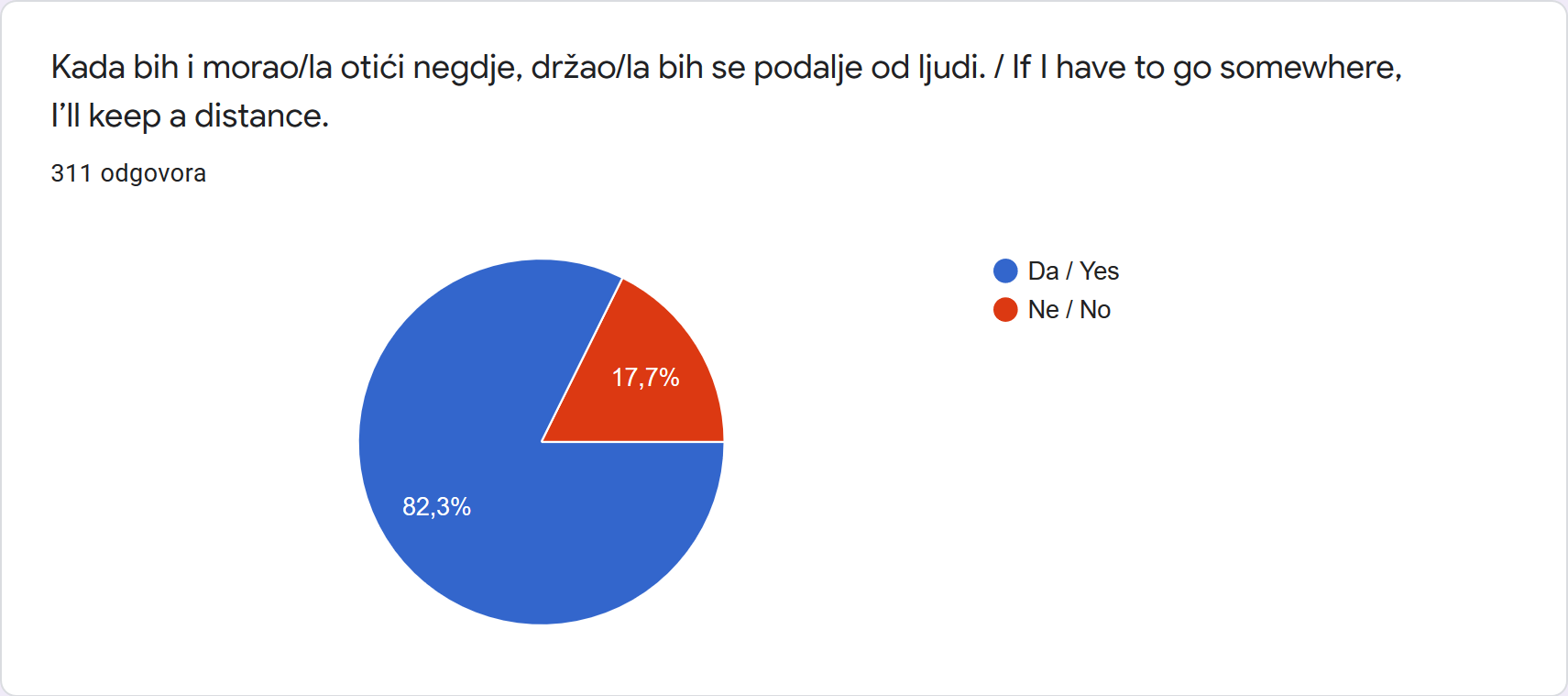
A little reminder for everyone: from tomorrow, gatherings of 40 people will be allowed, and e-passes are eliminated. Still, we are called to act responsibly.
Follow our live updates on the coronavirus crisis in Croatia.
Health Minister Beroš Talks Pandemic, Healthcare System and Political Ambitions in Wide-Ranging Interview
May 10, 2020 — Croatia’s Health Minister Vili Beroš has emerged as an unexpected star during the coronavirus. Often commended for partially orchestrating the Civil Protection Directorate’s response to the pandemic, the publicly humble and professorial neurosurgeon shies away from taking credit.
But with parliamentary elections likely this summer, the minister has become an unexpected trump card in the ruling Croatian Democratic Union's (HDZ) electoral ambitions.
Beroš spoke about Croatia's pandemic response, healthcare system and his role in the elections — including rumors he’ll be HDZ’s candidate for Mayor of Zagreb — in an interview with Jutarnji List.
How long is the working day of the Minister of Health at the time of the corona?
Oh! I got up at 5:30 a.m. and the night before I came home very late. It’s not exactly like that every day, but mostly it doesn’t go any differently. There is not only coronavirus, but also a number of other things that need to be done.
In recent days, I have been focused on reopening the health care system. There is always a danger of the virus entering, so it is important that nothing is overlooked, that patients and employees are not endangered, and that the system works at the same time.
The numbers say we won the battle with the coronavirus. Have we won the war, or what must we do so that a possible second wave does not surprise us?
The numbers show that the epidemic in Croatia is on a downward trajectory. This is what we have always wanted, that the number of infected and sick people is getting smaller day by day and that the infection is coming to an end. However, this still does not mean that, as you say, war has been won, because the infection is still going on in our country, but also in most countries in our environment.
As long as there is a real danger of its spread and a possible flare-up of the second wave, there must be no relaxation of either the citizens or the health system.
In addition, until a suitable vaccine and cure for coronavirus is found, we must all adapt our daily lives to the new conditions, take care of our own protection, but also the protection of others, avoid risky behaviors in public, maintain personal hygiene and do everything to whatever is possible to avoid possible infection.
Can we relax and how much? Are you afraid that this could ruin everything that has been done in the fight against coronavirus in recent months? The pressures are great. It seems like everyone would open everything right away!
There are relaxations of measures in everyday life and they will be in line with the further development of the epidemiological situation, but there is no relaxation for anyone, neither for the citizens nor for us health professionals. We see that even the slightest relaxation and inattention immediately bring the newly infected and the sick.
We have done a lot so far and we can all be happy and proud of it, but it would be a great sin to spoil it all with reckless moves and easy understanding of the situation in the days ahead and return to the beginning or worse.
Coronavirus is a new virus, a new world plague, it has a lot of unknowns and with previous experiences with it we need to be very careful.
We can defeat it, but it takes the common strength of all of us. We are witnessing what happened recently when only four people returned from abroad or the latest case on Brač, where a double-digit number of cases was recorded in just one day. This can very quickly, unfortunately, change the epidemiological picture. Such things can cause a chain reaction.
We follow what is happening in countries that started with faster opening, such as Denmark or Austria, where there were no major problems, and we are also in communication with world experts. They all warn of the possibility of a new wave. That's why caution is never enough.
Some resent you for opening churches, but not theaters, for banning work on Sundays, claiming it’s all done for political gain?
As the Minister of Health, I had the least influence in these opening measures. I left the decision on what is best to epidemiologists and ministries who gave recommendations on when and how to “loosen” a measure. It doesn’t matter, for example, how to open theaters, unless maybe it’s a monodrama. Not only must the audience be protected, but also the actors, because the performances require their interaction.
At the beginning of this epidemic, I pushed the profession to be careful so even now it's all the result of their thinking. I am more for talks and agreements, but provided that the result is containing the disease. The right measure is sometimes difficult to find, but it is important to give a general epidemiological framework.
You had moments during the epidemic when ‘everything went great’, but probably also those when tensions were rising. Uncertainty in the procurement of equipment at the beginning of COVID-19 in Croatia was certainly a very stressful circumstance.
From the beginning, we had the situation under control because we very quickly detected the zero patient who brought the virus from Italy, and then all other direct and indirect contacts, and therefore it was possible to keep the flow of infection under control.
On the other hand, we have had and still have very professional people in the health care system, especially in the epidemiological and infectological part, so this has also contributed to Croatia dealing with the epidemic effectively so far.
We had uncertainties and tensions over the procurement of equipment like all other countries, because the pandemic found the whole world with greater and urgent needs than the existing stocks and capacities of manufacturers at that time. The most important thing is that with the efforts of the entire Government and Prime Minister Andrej Plenković, we managed to overcome these obstacles as well.
Do we have enough equipment today to welcome a possible new wave of COVID-19?
We have enough equipment for the needs of our health system. We have more than 800 respirators, and we expect more soon as part of joint procurement in the European Union. We have protective equipment such as suits, masks, visors and gloves, as well as the necessary disinfectants in stock, but they are also constantly renewed in accordance with needs.
Having experience with the procurement of equipment, we must think about renewal and domestic production, because we must not be completely dependent on imports tomorrow. I believe we can do it.
Do you still think that we should have gone with these very restrictive measures? Swedish epidemiologist Johan Giesecke claims that we have exaggerated, that is, that at some point those who have closed up will fare worse. According to him, it is best to ‘close’ only the elderly, and the rest to ‘freely infect’ so the economy doesn’t suffer.
It would be nice if there was a universal recipe for organizing the defense of the population from a pandemic infection like this. There are so many approaches and ways to fight the virus. All this is still going on and it is not over so there is no one who could say, “This approach is the best.”
We in Croatia did what the epidemiological profession considered the most effective and this, to our happiness and satisfaction, proved successful when it comes to controlling the infection, measuring the number of infected, sick, isolated, cured and, unfortunately, dead.
Our economy has suffered all this time. However, we have committed ourselves to preserving people’s lives and health, believing that this is the most important thing. But we have also created the conditions for the gradual opening of economic activities whenever and wherever possible. Time will tell if we have chosen the best approach, but I personally believe that we did the best we could, and the results give me the right to do so.
Could we have prevented the entry of COVID-19 into homes for the elderly, and many are wondering how ‘no one is to blame’ for the spread of COVID-19 in the Split home for the elderly in Vukovarska?
When you look at the homes that the virus entered in relation to their total number in Croatia, and compare it with the situation in other countries, then you can see that we have long resisted its breakthrough into these institutions. There is no country that has managed to prevent the spread to homes for the elderly and infirm.
I wish it hadn't happened, as well as the entry of the virus into the hospital system, but this simply cannot be prevented, because nursing homes, as well as hospitals, cannot be completely isolated from all external influences due to the organization of work of all employees.
Nobody in the world has succeeded in that completely, not even us. If we look at the situation in the world, 64 percent of mortality in Norway was related to old people's homes, in Canada 57, Ireland 55, Spain 52, France 49, Belgium 46, and in Croatia 44 percent.
The coronavirus epidemic has shown many good sides of the Croatian health care system, but also where the bottlenecks are. Can it be expected that healthcare will finally move into an organization that will be at the service of patients, rather than a form without function?
I have been talking about the need to direct the health care system towards the patient since the beginning of my term. I want to get the patient back into the focus of the healthcare system. This means that patients do not need to adapt to the system, but vice versa, so that help arrives on time or when it is needed.
However, this epidemic is also very specific due to the occasional entry of the virus into the health system and the inability of health professionals to perform their work activities due to infection or epidemiological self-isolation. Only the rapid mobilization of health workers from other institutions could enable the continuous provision of health care. So far, we have completely succeeded in such activities.
Some health professionals did not like the opportunity to work ‘where it should be’.
I must admit that I did not receive any expressions of dissatisfaction from health professionals. On the contrary, I think we were all aware of our role.
After the epidemic, even longer waiting lists were created for examinations, diagnostics and surgical procedures. Reportedly, private individuals will also be hired to help clear them up.
At the moment, the analysis of waiting lists is underway and all health care institutions have been given the task to review the real situation with waiting lists and through communication with patients to ensure that what is missed is covered.
Therefore, it will be necessary to adjust the organization of work, additional shifts and work on weekends will be introduced. It is necessary to know, however, that the functioning of the health system will be adapted to epidemiological requirements in the future, until the end of the epidemic.
We will therefore need to have more precise answers to some very important questions such as, for example, who works how much, which means the introduction of staffing norms for employees, and with the help of computerization waiting lists should be arranged so that there is no duplication or triplication of orders.
In cases where it is established that the public health system will not be able to provide all the necessary services, the prolongation of which could cause health consequences, as has been the practice so far, part of the private health sector may be engaged to some extent.
Isn't this an opportunity to get additional information on the justification of many hospital visits and tests that are required?
This world crisis is an exceptional opportunity to learn certain lessons. Modern medicine should be based on clinical guidelines that would clearly indicate the need to perform certain both diagnostic and therapeutic procedures. Such guidelines, in addition to affecting the quality of health care delivery, also contribute to system optimization. If I am able, I will direct my efforts towards that goal. This also means that 80 percent of all cases must be resolved in primary health care, and only about 20 percent in the hospital, more expensive, system, which is not happening at the moment.
What will happen to KB Dubrava, which was turned into a respiratory-intensive center due to COVID-19, and now it will no longer be necessary. Namely, this is the only new hospital in Zagreb with a capacity of more than half of the never built hospital in Blato, which has been largely used so far. Can it be expected that, for example, it will merge with KBC Zagreb, which would make it possible not to have to rebuild three clinics destroyed by the earthquake?
KB Dubrava played, along with the Clinic for Infectious Diseases "Fran Mihaljević", the most important role in the care of patients with coronavirus. Thanks to the existing infrastructure, a primary respiratory-intensive center was formed in it.
The conversion of KB Dubrava is temporary during the COVID-19 epidemic. By my decision, after the expert working group of the Crisis Staff of the Ministry of Health adopted a joint consensus, KB Dubrava, along with three other large centers (KBC Split, KBC Rijeka, KBC Osijek) was designated as the primary respiratory-intensive center for the treatment of patients with coronavirus. It was a logical choice because it is a hospital complex with very good traffic access, with a heliport, with the possibility of accommodating about 300 patients who need respiratory help.
Dubrava will be in such a state of readiness until the epidemic passes, until the health profession estimates that we can return to the state before the epidemic. During the reactivation of the health system, polyclinic activity started in KB Dubrava from the beginning of May, and from May 18 it plans to start working on part of invasive diagnostics, and then the operating program. After the end of the epidemic, KB Dubrava will return to its usual activities.
The headquarters has received strong public support since the beginning of its work. You were accepted as experts and even your HDZ background did not matter. As soon as the stories about the upcoming parliamentary elections appeared, the political public and the Civil Protection Headquarters became associated with the political party. Its expertise was called into question. They say that the Headquarters is in the function of politics, that even strict measures have been relaxed so that elections can be held?
The Civil Protection Headquarters has done, and still does, in addition to the entire health system, a very important role in the effective fight against the coronavirus epidemic in Croatia. From the first day, it shares all information about the infection with the Croatian public and citizens, sends them complete and timely messages on how to most effectively protect themselves from the infection, how to ensure that the infection does not spread further, how to organize life and activities in these circumstances.
Holders of activities in the Headquarters are top experts and professionals, not only those who regularly appear at press conferences, but also a huge number of those invisible to citizens.
Don't the results we have speak best about the efficiency of everyone, from citizens, health workers to those services that have enabled life to take place in these not-at-all easy circumstances?
The political coloration is created by the Deputy Prime Minister and the Minister of the Interior, and I, as a Minister, because we are both part of the Government, and the Government is a political body.
When the Government is HDZ, then I see no reason why anyone should be surprised that both ministers are members of that party.
What are your political ambitions? Will you be on the HDZ list in, it seems, the upcoming elections?
My political ambitions are that as the Minister of Health and a member of this Government, I do everything to make the public health system as efficient and accessible as possible for Croatian citizens. The coronavirus epidemic has shown that our healthcare system is ready to deal with all challenges, that we have top experts in many fields, and that with small organizational shifts we can be better and more efficient.
So far, I have been most engaged in the epidemic, but I am devoting more and more time and energy to reducing waiting lists to provide our patients with everything they have been deprived of in the past two or three months, as well as solving all other problems plaguing our health system.
The recent earthquake in Zagreb further shook our hospitals, reduced capacity and imposed on us the urgent need to address capacity. My ambitions, as well as the policy of this Government, are to look for quick and economical solutions in this area. I believe we will show very soon that our plans are not just words.
According to some sources, you will not only be on the list for the parliamentary elections. The party reportedly has bigger ambitions for you. Many say that the HDZ has not had a real candidate for mayor of Zagreb for a long time and that you would be ideal. Do you intend to run?
I am a member of the ruling party, and teamwork is very important in politics. And as a minister, I am part of a successful team. I would like us to gain the trust of voters in the next parliamentary elections to continue to lead the state policy of Croatia.
The president and party bodies decide on the electoral lists, so eventually my place in the elections will depend not only on my ambitions but also on the needs of the HDZ and the electoral strategy. I believe in the success of our party in the elections, and then we will put together teams for new victories.
Are you planning a vacation?
If it's possible. In that case, I will go to my Jelsa. I recharge a lot of energy there. If I succeed, it will be a reward for me to “honor” myself after this “baptism of fire” with a corona epidemic.
Croatians Miss Socializing, Travel, and Coffee (Of Course)
May 10, 2020 — The coronavirus pandemic took a toll on a culture used to informal gatherings, family meals, and hours spent philosophizing over a single macchiato. Croatians miss socializing, excursions and trips, and coffee in cafes, according to a recent poll gauging the general mood during the pandemic.
A survey conducted in early May by the Hendal Agency and Franck showed Croats citizens missed spending time with loved ones the most (78 percent), trips and travels (48 percent), and drinking coffee in cafes (44 percent).
The coronavirus epidemic has negatively affected 87 percent of citizens, mostly the inhabitants of Dalmatia, especially emotional life. The last few months since the epidemic upended daily live caused dissatisfaction in 53 percent of respondents. Others felt anger (29 percent) and sadness. (29 percent).
For men, the epidemic mostly caused boredom, for women, sadness. As many as 34 percent of citizens, primarily men, state that the epidemic and restrictions that came with it have caused boredom in their daily lives, while 28 percent felt lonely. Sadness also took hold, especially emphasized by women who took part in the poll.
About a third of respondents (34 percent) try to maintain a positive attitude and hope that life will return to normal soon.
That Croatian citizens are looking forward to the easing of restrictive measures and the reopening of cafes and terraces is shown by the 47 percent who said they will visit a cafe next week to drink a coffee, while a third say they will wait until the pandemic blows over completely. Dalmatians especially are looking forward to drinking coffee in cafes, with 65 percent saying they will first order coffee when they finally sit down at a cafe.
The crisis caused by the coronavirus did not have a significant impact on the habits of 63 percent of citizens when it comes to coffee drinking rituals, as evidenced by the 66 percent of citizens who normally have the habit of visiting cafes and will continue this habit after the epidemic ends.
During the restrictions, 47 percent of coffee lovers said coffee remained a part of their daily ritual. Only the place where they drank changed.
Hendal's earlier research, also conducted in collaboration with Franck, in October last year showed that Croatia is a country of coffee drinkers and "let's go for coffee" is still by far the most common invitation to socialize among Croats, with 87.5 percent using it as an excuse to socialize.
The most popular types of coffee are ground Turkish coffee and espresso in a cafe that is drunk by almost 70 percent of respondents. When coffee is mentioned, 28 percent of citizens cite morning as the first association, 16 percent waking up, 15 percent think of its smell.
Croatia’s Phase 3 Starts Monday, Balancing Health, Economics and Coffee
May 10, 2020 — The third phase of relaxed measures brings the greatest normalization of life to date, according to Jutarnji List. Starting Monday morning, citizens can go to their favorite cafe, order coffee and leaf through the newspaper. Or go to a restaurant for lunch, and some children will return to school.
Shopping malls will reopen and inter-county transportation and domestic flights will resume. National parks will open for excursionists, and groups can increase from five to ten people.
Besides these already-announced concessions, driving schools can start working. Quarantine and self-isolation for international transport drivers will also cease.
Also, after May 11, it is possible that there will be a complete abolition of e-passes, allowing Croats to roam the country unabated.
Croatian officials decided catering businesses such as restaurants and cafes can use indoor spaces under certain conditions. Previous rules locked out businesses without terraces or limited space.
Also, working hours can go until 11 p.m., two hours more than originally planned. But the extra time will go as much towards meeting new hygiene standards as it will to serving guests. The rules sound nearly militaristic.
All tables must be empty by the time guests arrive. Utensils arrive after guests sit. Presumably, they’ll already know their orders. The menus should stand out prominently at the entrance or other visible place in an appropriately plasticized cover.
Croatia’s Civil Protection Directorate suggests guests enter only after when a previous group leaves the premises. The physical distance between individual groups of visitors must be at least one-and-a-half meters.
Social distancing rules will limit the number of visitors and leave vast chunks of unused space. The tables should sit one-and-a-half meters apart. Larger groups of guests can sit together at tables, and the distance between them and other groups must be at least one-and-a-half meters.
Visitors can also order a meal or drink in the restaurant to-go. When ordering, the physical distance of at least one-and-a-half meters between customers waiting in line still applies.
It is also possible to serve standing guests if they keep a physical distance.
After the departure of each group of guests, the table, chairs, and other surfaces that the guests touched must be wiped with disinfectant. Snacks cannot sit in communal bowls, nor can salt, pepper, oil, vinegar, and other spices stay on the tables.
As for employees, they must adhere to all measures, hand-washing, and disinfection rules. They must notify the employer of any signs of illness or fever and not come to work.
As for schools, lower grades start on Monday, and kindergartens are opening as well. The distance between the children should be two meters. There should be up to nine children in a class and one educator or teacher, or some other configuration limited to ten people.
Here is a full list of new, loosened restrictions:
Cafes and Restaurants
Can work from 6 a.m. to 11 p.m.
Not limited to terrace-only businesses
Tables must be 1.5 meters apart
No limit to the number of people who can sit at one table
Sitting at the bar is prohibited
The waiter should disinfect his hands before serving each new table
Authorities recommend air conditioners remain off
After the departure of each group of guests, the tables should be disinfected, and the tablecloths changed
No snacks on the tables
Salt and pepper containers must not be on the table, but new, disinfected ones are brought for each group of guests
Employees must take their temperature every morning before coming to work
It is recommended that employees wear protective masks and gloves
Schools and Kindergartens
Classes start for students from 1st to 4th grade
A limit of 9 students in a class
Parents who can still keep their kids home should do so
Employees must maintain a distance of 2 meters from each other and try to do the same in relation to children
In the class and kindergarten group, the maximum number of persons can be 10 (nine students and a teacher, eight children and two educators, etc. ...)
After the formation of the group, no new children are admitted to the groups/classes for the next 14 days
As much time as possible is spent outdoors
Parents hand over their children in front of the kindergarten building and do not enter the facility
Classes for children begin at different times to meet as little as possible
Recess is also staggered to avoid overlap between classes
Children have lunch in the classroom, food is delivered to them at the classroom door and the teacher shares it
Teachers should have their temperature measured when arriving at work and keep special records
Children should not wear masks
Shopping Centers
Maximum 15 customers for every 100 square meters
The distance between customers should be strictly observed
15 customers can enter the store for every 100 square meters of net area
If it is difficult to determine the total area, the maximum number of customers allowed in the store is obtained by dividing the total area by 10
In textile shops, it is recommended to sell without trying on clothes, especially those worn over the head
If the clothing is tried on, it must be quarantined for five days before it can be put back on sale
The number of baskets in the store must be equal to the maximum number of customers allowed
Staff must wear protective masks
Customers are advised to wear a mask
Disinfectants must be placed at the entrances to the center and each store, the use of which is mandatory
Employees must measure their temperature before coming to work
Inter-county public transport
Plexiglas should be placed between the driver and the passenger or the first row of seats should be left empty
One person should sit in a row in buses, in such a way that they sit alternately on the left and right seats
In trains that have seats in rows as a bus, one person should sit in a row in such a way that they sit alternately on the left and right seats.
It is recommended that passengers wear masks
The conductor must wear a mask and gloves
The driver is recommended to wear a mask
Hygiene of the driver's cab should be maintained
Vehicles should be regularly ventilated and surfaces that are frequently touched should be disinfected
Drivers must disinfect their hands after placing their luggage in the luggage compartment
Contactless payment should be encouraged
National Parks
Mandatory distance between visitors
Adapt the park program to the new conditions (abolish panoramic rides during which it is not possible to ensure a distance, etc.)
Driving Schools
First aid courses without artificial respiration
Provide disinfectant in the car
It is recommended that both the candidate and the instructor wear masks
There should be a 15-minute break between classes and the driver's and front passenger's areas should be disinfected
Hold theoretical classes with strict adherence to the physical distance of 1.5 meters between students
Keep records of the presence of participants
Culture Minister Participates in Europe Day Online Seminar
ZAGREB, May 10, 2020 - Croatian Culture Minister Nina Obuljen Koržinek took part on Saturday on the occasion of Europe Day in an online seminar co-organised by Europa Nostra and Europeana which addressed the impact of the COVID-19 pandemic on cultural heritage.
Participants also discussed recovery prospects and the need for further action and defining policies at European level, the ministry said in a press release.
Obuljen Koržinek said the crisis affected the cultural and creative sectors, including cultural heritage, especially strongly.
Cultural heritage risk management has been one of the main topics of Croatia's presidency of the Council of the European Union in the field of culture, which gained new significance after the devastating Zagreb earthquake in late March, she added.
Numerous measures to mitigate the consequences of the pandemic have been taken at national level, and the Croatian presidency has been in contact with EU member states, international organisations and professional associations to gain better insight into the situation, difficulties and assistance measures at European level, the minister said.
She recalled that on April 30 the ministers of culture signed a declaration on the need to adopt an ambitious and sustainable response to facilitate a swift, effective and flexible recovery of the cultural and creative sectors.
The minister said the Council of Ministers would meet on May 19 to discuss ways to align the support system and cultural policies in the post-coronavirus period in the EU and nationally.
Participants in the seminar supported a joint statement which the organisations comprising he European Heritage Alliance have prepared with a view to putting cultural heritage in the centre of Europe's recovery and revival.
More news about Croatia and the EU can be found in the Politics section.
Slovenia: Relations with Croatia Better Despite Border Issue
ZAGREB, May 10, 2020 - Slovenian Foreign Minister Anže Logar said on Saturday the Janez Janša cabinet wanted good relations with all neighbours and that relations with Croatia had improved even though the border dispute remained unsolved.
Speaking for Saturday's issue of the Ljubljana Delo daily, Logar said good relations with neighbours "should be based on respect, the rule of law, but also on a certain chemistry."
He said "there are contentious issues which still haven't been solved" but that Ljubljana-Zagreb relations had been "reset" and that there existed "mutual respect and trust."
Logar said the previous Slovenian government sued Croatia before the end of its term over its non-application of a border arbitration ruling without having ensured a political consensus for that.
He said previous Slovenian Prime Minister Miro Cerar "highlighted that border issue at practically every international forum and in all that time we made not one step forward about the arbitration issue."
He said that caused tensions in the two countries' communication which the incumbent government was defusing, wishing to solve outstanding issues via quiet diplomacy and better cooperation.
"At the beginning of the COVID-19 epidemic, a certain distrust was felt in the air which led to problems in international freight transport, but we resolved those issues in cooperation with Croatian (Foreign Minister) Gordan Grlić Radman relatively quickly," Logar was quoted as saying.
"We were cooperative and well-synchronised, which is a good start for the next steps. The epidemic has put relations on a new starting point."
Logar noted that Croatia could not put the focus on bilateral issues in the first half of the year because of its presidency of the Council of the EU and that some of those issues could not be solved. This has yet to be put on the agenda, he added.
But Croatia is "on the eve of an election" so the border issue will wait for the next government, Logar said.
As for the Janša cabinet's stance on the border arbitration ruling, he reiterated that "the arbitration award is clear."
"We believe that legal acts should be honoured and that's a negotiating position which is closed for us, while all the rest is a matter of agreement," Logar said.
More news about relations between Croatia and Slovenia can be found in the Politics section.
Croatia COVID-19 Travel, Tourism, Flights & Borders Update May 10, 2020
UPDATE - THINGS ARE CHANGING FAST - HERE IS THE CURRENT OVERVIEW FROM MAY 19, 2020
May 10, 2020 - So what is the latest Croatia corona travel advice? When will borders open, flights take off, and tourism finally begin? An overview of what we know at the moment.
Can you travel to Croatia? Around Croatia? Is Croatia safer than other destinations? When will tourism start? Who can cross the border?
With so many questions, so much uncertainty, and SO many people wanting to go on holiday and get tourism started, here is what we know today. One thing is certain - things will be very different from tomorrow, May 11, 2020, with the third level of easing of measures, including on travel. Full details below.
The Croatian National Tourist Board and Ministry of Tourism official travel advice pages
The national tourist board has a page called Coronavirus 2019 nCoV Q&A.
Ministry of Tourism COVID-19 travel page.
Croatia corona travel - how safe is Croatia and how well has it handled the corona crisis?
Croatia has handled the health threat from coronavirus extremely well, both in terms of measures taken and communication. The authorities reacted quicker than most as they watched the horror unfold across the Adriatic in Italy, and an extremely effective National Civil Protection Headquarters has kept infections and deaths well below the European average. And this despite the additional challenges brought on by the Zagreb earthquakes.
(Source - Koronavirus.hr)
Croatia currently has 2,176 cases of infection, which has resulted in 87 deaths. The majority of cases - 1,726 - have recovered.
The authorities also moved quickly not only to close borders, but also to localise infection by severely restricting all unnecessary travel between municipalities. Its famous tourist islands have remained almost totally corona-free. Only those with an island ID were permitted to use the ferries, and only then with a special purpose.
(Source Velebit.ai)
So in terms of its approach to the virus, and the results, there is perhaps nowhere better than Croatia.
And then question on everyone's lips is - when can we travel to Croatia, and is Croatia corona travel safe?
Nothing is totally safe in these very uncertain times, but I would say that COMPARITAVELY speaking, Croatia is as safe as anywhere in Europe to come for a holiday IF conditions allow. More on that below.
What is the current situation with Croatia's borders? Who can enter the country?
- at Bregana and Macelj (with Slovenia);
- at Goričan and Duboševica (with Hungary);
- at Nova Sela, Stara Gradiška and Slavonski Šamac (with Bosnia and Herzegovina);
- at Bajakovo (with Serbia).
- use motorways only;
- use the following rest areas only: Novska jug, Novska sjever, Kozjak jug, Prokljan sjever, Draganić sjever, Draganić jug, Bačva, Ravna Gora, Lužani in direction Lipovac and Staro Petrovo Selo in direction Bregana;
- during breaks keep distance between You and other people;
- obey the rules of Civil protection or police officers.
- at Goričan border crossing, detour: Goričan junction-ŽC2026-DC3;
- at Dvor and Vitaljina border crossings - open only to passenger traffic;
- at Gunja border crossing - there is a traffic ban on freight vehicles and buses.
Due to traffic bans on freight vehicles in Slovenia long delays should be expected in freight traffic at Bregana/Obrežje and Macelj/Gruškovje border crossings starting 1 June.
Additionally, the Saturday press conference detailed some changes in specific cases for border crossing. More in this TCN article - Where Can We Go Outside Croatia, and Who Can Enter? Bozinovic Explains New Border Rules.
What is the latest news about the borders opening for tourism?
Everyone WANTS tourism to begin, but just how safe is it, when might it happen, and will it be for everyone?
From the Ministry of Tourism website:
Big interest in opening borders, says tourism minister
Croatian, Italian tourism ministers discuss plans for tourism
Hotels and camps in Istria to open May 11
Minister says talks on cross-border travel underway (May 4)
Some clues from some recent TCN articles:
Trip Report of Belgian National to Hvar by Car on May 7-8, 2020 (May 9)
Source Claims Croatia Could Reopen Borders Incrementally in June (May 8)
Croatian Tourism: Dubrovnik Seeks Special Flight Arrangements (May 5)
Any Hope for Croatian Tourist Season? We're Neighbours' First Choice (May 4)
Gari Cappelli and Slovenia Optimistic about Opening Borders between Two Countries (April 30)
EU Ministers Meet: COVID-19 Passport, Cro Card and More (April 28)
Istria County Tourism Committee Hosts First Session about Opening Borders (April 28)
COVID-19 in Croatia: Gari Cappelli Discusses Summer Travel with EU Tourism Ministers (April 28)
Austrian Media: Croatia is Our Best Chance for Summer Holiday (April 27)
German Bild on Croatia: Corona-Free Destination for Summer Travel (April 25)
What about flights to Croatia? An overview of all the major airlines to Croatia and their current positions
If there is one tiny cloud with silver lining for Croatian tourism, it is that the vast majority of its visitors arrive by car. The proximity of countries such as Slovenia, Austria, Germany, Poland, Czechia, Slovakia, Hungary and Serbia mean that the season will not be a total disaster if it is allowed to start. Holiday options for these countries will be more limited due to the drastic reduction in flights which will be a post-corona reality. So destinations such as Greece, Turkey and Egypt will be much harder to reach than hopping in a car from Central or Eastern Europe.
You can read some detailed analysis of the Croatian aviation market in the future from Max Oldorf, COO of ch-aviation in this TCN interview this week:
Flights to Croatia Post-Corona: Overview with Max Oldorf, COO of ch-aviation
The big intercontinental carriers have mostly writtten off 2020 totally, with Qatar Airways and American Airlines, delaying Dubrovnik until 2021. And with the CEO of easyJet saying the airline will feel like a new startup post-corona, Ryanair's homepage focusing on September breaks since March, and Norwegian Air on the brink, the reality is that flights to Croatia will be much reduced. The official Koronavirus website has produced this very helpful overview of where individual airlines are with their plans. You can follow the updated page here.
CROATIA
From May 4, 2020, it is mandatory to use face masks / headgear on all Croatia Airlines flights. Passengers on all Croatia Airlines flights are required to bring and wear face masks or covers. Masks must be worn throughout the stay in the cabin of the aircraft.
Acceptable face covers:
two-layer cotton face masks
medical (surgical) face masks
filter half masks with and without valve (FFP2 / N95)
From May 11, Croatia Airlines will operate flights on the following routes within Croatia:
Zagreb - Split
OU652 (08:00 - 09:00)
OU656 (20:20 - 21:10)
Split - Zagreb
OU653 (09:45 - 10:35)
OU657 (21:50 - 22:40)
Zagreb - Dubrovnik
OU662 (08:00 - 09:05)
OU664 (20:20 - 21:25)
Dubrovnik - Zagreb
OU663 (09:50 - 10:55)
OU665 (22:10 - 23:15)
Information on other domestic flights will be published later.
Dubrovnik Airport is closed to civilian traffic until 02/05/2020. due to preventive measures to prevent the spread of coronaviruses. More details.
Osijek Airport - from 27.4. the Pothodnik branch reopens. While prevention measures are in place, the opening hours will be 9 am-5pm on weekdays (Monday through Friday). More information can be obtained by e-mail This email address is being protected from spambots. You need JavaScript enabled to view it. and phone +38531284611. It is recommended that all inquiries be sent in writing to the specified e-mail. More information.
Rijeka Airport - latest info here.
Zagreb Airport - latest info here.
The Croatia Airlines contact center is available on the following numbers: 0800 77 77 (toll free calls from Croatia), 072 500 505 or +385 1 66 76 555. More info.
AirBaltic - All AirBaltic connections are suspended from March 17 to May 12, 2020, including airBaltic operations from Estonia and Lithuania. Click for the latest info.
Air France - Due to coronavirus, they have reduced 90% of flight capacity and this supply reduction is in effect until the end of May. Due to the closure of Paris-Orly Airport, all flights from and to Paris go via Paris-Charles de Gaulle Airport. Latest info.
Air Canada has suspended all flights between Toronto and Zagreb for the summer of 2020.
Austrian Airlines, a branch of Lufthansa, has decided to suspend all its scheduled flights until the end of May 2020. More details.
British Airways - the latest updates.
Brussels Airlines has decided to suspend flights until May 15, 2020. More details.
Czech Airlines has suspended flights to / from Prague from 16 March, as a result of the Czech government's declaration of a state of emergency and a related ban on foreigners entering the Czech Republic. More details.
easyJet - They made the decision to ground the aircraft until further notice. More details.
Emirates - Emirates has established limited passenger flights to transport passengers departing from the UAE. More details.
Germanwings - Germanwings flights no longer exist.
KLM - Latest info.
Lufthansa - More details.
Ryanair - As most EU countries have imposed flight bans or other restrictions, more than 90% of Ryanair's aircraft are grounded, and the limited flight schedule has been extended until 28 May. More details.
Turkish Airlines - All international flights are canceled until May 28, 2020. More details.
Qatar Airways - all direct flights between Zagreb and Doha are suspended until May 31, 2020. Flexible when changing travel plans until September 30, 2020. For more information, contact the Qatar Airways office in Zagreb at +385 (0) 1 4961110 / 111, email: This email address is being protected from spambots. You need JavaScript enabled to view it. or check the details here.
Wizz Air - In early May, it will fly from Budapest to Athens, Barcelona, Berlin, Birmingham, Basel, Dortmund, Eindhoven, Gothenburg, London, Liverpool, Madrid, Podgorica, Sarajevo, Stockholm and Targa Mures. See more here.
What about freedom of movement within Croatia at the moment?
After weeks of being confined to the individual municipality, restrictions were recently lifted on travel within Croatia's 20 regions (but not in all cases). It is expected that this will be loosened further if the current situation remains stable - from May 11. Please note that countywide travel is not the case everywhere - for the latest, check the official government Koronavirus website. An exception to this is the island of Brac, which has reimposed measures after the recent outbreak.
The authorities announced last week that those with real estate elsewhere in Croatia can now get a permit to visit it - good news for the many people with holiday homes on the coast.
Expect a major increase in traffic on the roads and ferries on May 11.
Relaxing measures: what is possible now, and how will travel change on May 11?
On April 23, 2020, Prime Minister Plenkovic announced his 3-phase plan to loosen restrictions.
Part one has already come into force:
PHASE 1 - April 27, 2020
- Ability to work for all business entities engaged in trade, except those operating within shopping centers
- Continuation of work to all business entities engaged in service activities, except those in which close contact with customers is observed, respecting physical distance measures (for example, carpenter, tailor, locksmith, travel agencies, photo studio)
- Introduction of public city and suburban transport lines and express lines for islands not connected by ferry
- Libraries, museums, galleries, antiques and bookstores to open
- Facilitating training of athletes I and II. categories in individual sports and senior sports teams competing in the highest level of competition
- Facilitating the state professional exam for priority groups of students
And the second phase is due to come into effect on Monday:
PHASE 2 - May 4, 2020
- Enabling the full operation of the public health system, with the exception of exceptions in line with the Ministry of Health measures
- Enabling the full operation of the private health system, with due regard for specific epidemiological measures
- Ability to work for all business entities engaged in service activities in which close contact with clients is observed, with respect to specific epidemiological measures (for example, hairdressers, beauticians, barbers, pedicurists)
PHASE 3 - May 11, 2020
- Gatherings of up to 10 people in one place allowed, while respecting physical distance measures
- Facilitating the operation of shopping malls while respecting specific epidemiological measures
- Facilitating the work of preschools and elementary classes from grades 1-4 and special classes and working with children with disabilities who have a teaching assistant
- Laboratory, artistic and clinical exercises and practical work allowed in small groups in higher education
- Introduction of inter-county and domestic air services
- Allowing catering facilities to work exclusively in outdoor areas and terraces
- Allowing catering facilities to work in accommodation facilities only for users of accommodation services
- Operation of national and nature parks allowed
- Expanding opportunities for issuing e-passes
What is the situation with ferries in Croatia?
Zadar-Ancona international ferry operates for freight vehicles only.
A reduced service is running - here is the timetable in full in English.
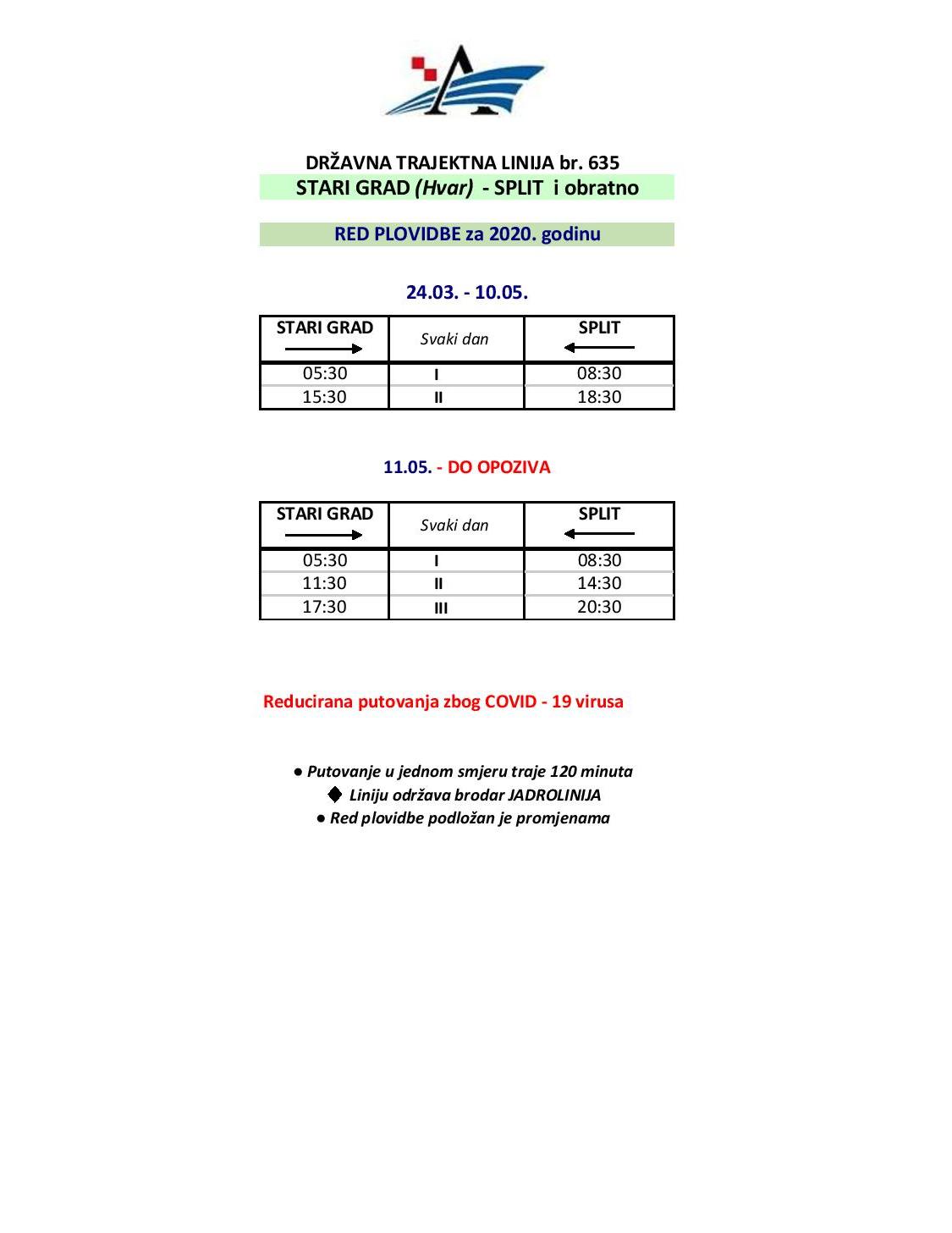
Tomorrow will see an extra ferry from Split to Stari Grad on Hvar, for example.
TCN reports from the ferry terminal in Stari Grad on Hvar to give an indication of what current ferry traffic is like.
You can check the latest news in English on the Jadrolinija website.
The latest HAK ferry information in English is here.
Are buses running between cities in Croatia?
Currently no, but they will start from tomorrow, May 11.
A really good resource from GetByBus gives you all the latest.
Also worth a read on the new realities on buses:
FlixBus Returning to Croatian Roads, Passenger Instructions Published
What about local transport?
Some local transport has now restarted. I don't have more information currently than what is in the links below, but happy to add if anyone wants to send updates to This email address is being protected from spambots. You need JavaScript enabled to view it. Subject Travel Update
New changes to the ZET tram timetable in Zagreb (May 4)
An overview of the situation in Zagreb. (April 26)
Promet Split Back in Action Monday: Bus Timetables, Tickets, and Rules (April 26)
Are there any trains currently running in Croatia?
Currently no, but that will change tomorrow, May 11. From the HAK website:
What is the situation on Croatia's roads and motorways?
There is obviously a lot less traffic on the roads currently. For the latest information on roadworks and other problems, check this HAK page (in English)
Are taxis and private transfers available in Croatia?
Yes. I checked with one of the most reliable providers, Octopus Transfers, and they are able to cover transfers all over the country.
What are the self-isolation rules for people entering Croatia currently?
People entering Croatia have been required to self-isolate for 14 days.
However, in the National Civil Protection Headquarter's press conference on Saturday, May 9, Interior Minister Davor Bozinovic said that everyone coming into Croatia would be given clear instructions by the Croatian Institute of Public Health.
This would not mean mandatory self-isolation, as it is unrealistic to let someone come for economic reasons or other business meetings and prevent them from leaving their place or hotel or any other accommodation, the Minister said.
The situation is constantly evolving, and for the latest on travel updates and all other coronavirus developments, we recommend you follow the dedicated TCN COVID-19 section.
If there are errors or omissions in the above, please contact me at This email address is being protected from spambots. You need JavaScript enabled to view it. Subject Travel Update, so that I can get this resource updated. Thanks in advance and stay safe.

